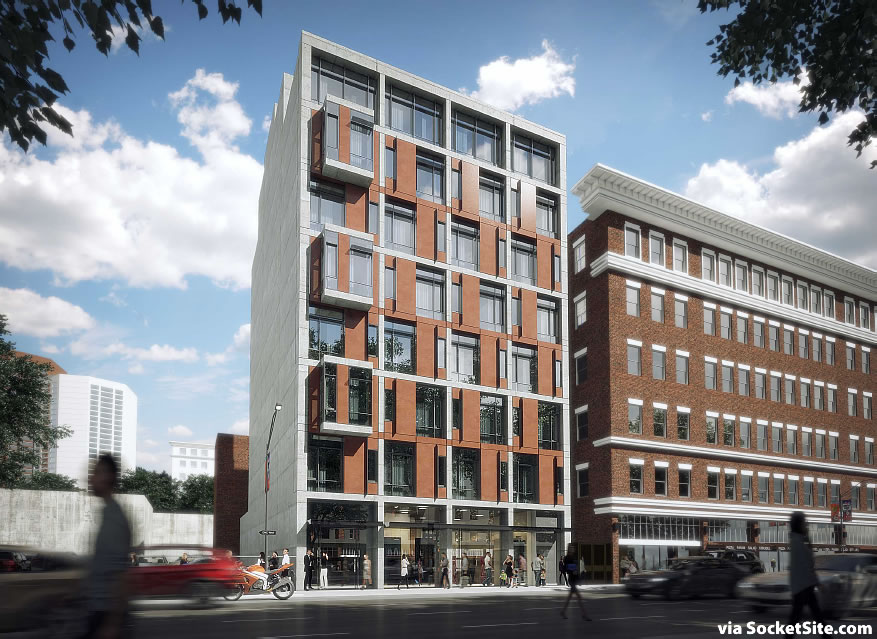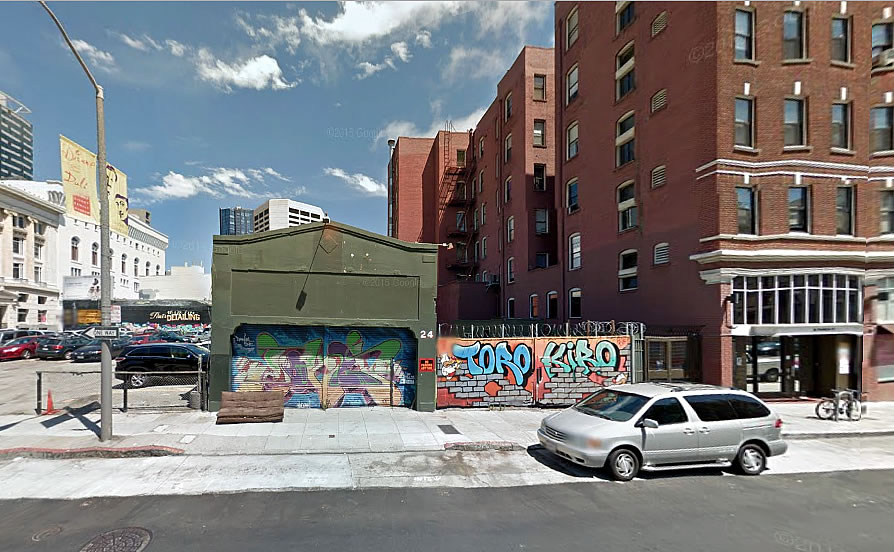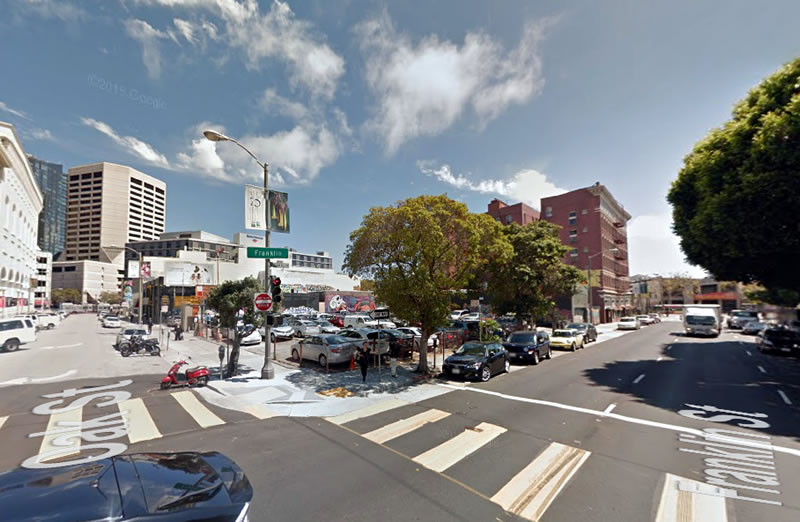Having just been granted a neighborhood plan-based exemption from having to complete a more extensive environmental review, the plans for razing the former Franklin Auto Body Shop and parking lot at 22-24 Franklin Street and constructing an eight-story building upon the Hayes Valley site are poised to be approved by San Francisco’s Planning Commission next week.
Originally slated for review this past December, the proposed development includes 35 apartments* over 2,100 square feet of retail and would reach 85-feet in height with a combination of common and private roof decks.
As the proposed development doesn’t include any off-street parking, except for a room in which to park 35 bikes, the existing curb cuts in front of the building would be removed. And if approved, the development team anticipates the project breaking ground this year, with occupancy by the end of 2017.
And once again, while formal plans to develop the adjacent half-acre parking lot at the corner of Franklin and Oak have yet to be submitted to Planning, the 98 Franklin Street site is in play and zoned for development up to 85-feet in height.
UPDATE: While likely to be condo mapped, the developer currently intends to rent the units, including four (4) at below market rates as currently required.



What about the rights of local auto body businesses? They are being forced out!
And what happens to the half-Jag XJ on the wall?
the jaguar has been gone for years already.
#MechanicsLivesMatter
I hope you’re kidding. First, the body shop is already closed.
But did the body shop own the property or were they leasing? If leasing, they didn’t have the right to unconditionally stay for eternity, it’s not their land (I THINK the concept of land ownership still exists in this country…). If they DID own the property, why did they close? Did the business owner retire? Did they go bankrupt? Did they lose their business license for some reason? Do you know the answers to any of these questions, or are you shooting from the hip?
that’s what 3rd St and SSF are for.
this development is just adding more cars to the street. Why do developers get away with not building some off-street parking. Otherwise they are creating more congestion and more pollution and pushing costs of parking onto the city. The EIR process should incorporate this, as it clearly is bad for the environment, and they should have to pay some fee for not including parking.
I guess we can transfer the current colloquy on this subject from 2100 Market to over here. Then, there are the 48 units without parking proposed for 1700 Market as well as the 35 units without parking rising across the street at One Franklin now nearing completion.
This is a very serious issue which warrants followup study in a city where currently 69% of households maintain at least one private passenger car. Are/How are they filling these places? If people move in and continue the pattern of car ownership, how are they coping and with what effect upon the existing neighborhood?
Remember that 69% number is calculated from existing households, i.e. single family homes in the sunset with space for 4 cars. I don’t think the future tenants of buildings like this have the same lifestyle needs as our existing population, and are much more reliant on car-share or alternative transit. That said, some of them certainly will own cars—but I’d wager that can more than afford to rent a private parking space.
This is an endless argument here. Since this is happening we should all come back in 10 years and have Jake look up some stats for us
Agreed! Can’t we just argue about bikes instead? 😉
I really like Orland’s idea. This should be very easy to assess – take the new building addresses and x-ref with auto registration and parking permit data for those addresses.
Hypothesis A: The new residents are young, tech-savvy, green types who rely on tech buses, uber and mass transit and therefore do not need parking.
Hypothesis B: The new residents are wealthier than longer-term residents given the high buying costs and are thus more likely to own cars, and therefore need on-site parking so we don’t externalize it to the public.
Let’s see which is correct. The only data of which I’m aware (from the always thorough Jake) indicate that car ownership rates in SF are going up overall. This would tend to support “B.” But perhaps the buyers of the new parking-less buildings are exceptions. Let’s get some precise data on it and set policy that is consistent with reality rather than hypothesis.
Just for the sake of argument where would wealthy residents park their cars in this area? It is sketchy in one direction and many near by streets ban parking at night don’t they? Seems like a nightmare
zig, a few wealthy can rent monthly parking at the Performing Arts Garage or 1 Polk and hoof it home. But if enough wealthy move around here the valet parking services should have most of the business. They can pickup or deliver your car at your building and park it minutes away at Civic Center or another contract garage. And they could even use your otherwise empty bike space to stash their bike for the carless leg to/from the garage. The wealthy will always have choices, including buying in a lux building with deeded parking.
Jake
I am not seeing this as being the same sort of issue as what you describe with people parking on public streets. I am persuaded by some of your arguments and data but why would we care about valet parking?
There are studies that indicate having deeded parking does induce car ownership so I assume there will in total less car ownership and more choice in this case with unbunded parking.
I don’t think you should care about valet parking, unless you want to use it or get into the business. I was just answering your question about how wealthy people could live here, own a car, and not suffer the nightmarish street parking conditions.
The street parking in this area is bound to get much tighter with so many of these infill projects with minimal or no parking. Also, the neighborhood is a bit rougher than up Market by 14th. That should mean people will be more willing to pay not to park on the street, whether by using a valet or just foregoing a car and racking up taxi/uber/etc bills. A poster on SS said (s)he spends hundreds of dollars a month on uber and hundreds on car rentals. And still has to ride a bus to work.
And I agree that having parking on the deed to a housing unit is likely to induce car ownership. These projects could entitle it separately. The larger ones could even run it as a public garage, which would benefit the neighborhood and make it easier to locate a carshare there.
Great thought experiment here (or at a dinner party when discussing parking) is to propose that residents of these buildings with no or under-provisioned parking forfeit the right to get a residential parking permit.
After all, if Hypothesis A is correct, why should they care?
If known upfront it would just be self selection
Sure, that’s an option.
The basic problem is that the permits are oversubscribed, and there is no current policy for dealing with that, except to restrict the construction of housing as much as possible.
We could also just price street parking at market rates. Permit prices are joke for use of a valuable public resource.
It’s been studied hundreds of times. Quite plainly, you two are wrong.
Well over 50% of HV residents do not own a car…..
That might be true, but cars per housing unit determines the parking load. In addition, 50% of the people that travel to HV get there by car, according to SFMTA. The businesses there attract many car parking customers. It is well-served by freeway and main roads.
FWIW, SF has roughly one car for every two people, but it has more than one car per household. So, not surprising that most individuals in HV would not own a car, but most households there have a car. No doubt about that. US Census data shows that clearly. BTW, where did your stat come from?
I don’t think they could dig to build a significant garage because they are literally on top of the Muni subway…
I recommend that you look at some numbers to see what the situation really is. For example, did you know that for new housing being built 88% of the population increase do not have a car? Therefore to keep up with the demand the city only needs to have parking for 12% of the units. And by the way, Washington DC has the same numbers. This is the future.
Which means (taking that number at face value) that this building will add a demand of just over 4 cars to the area, without providing any off-site parking for them.
And to be clear, I’m not arguing about a need for a 1:1 ratio, or 1:2 ratio, etc. Rather, I simply believe that it’s unsupported fancy to think that a building like this (or the building proposed to replace Home in the Castro) will add *no* parking demand. Even taking your 88% figure as gospel, that means that there *will* be parking needs added to the city – which this building should be required to offset.
It’ll also add to a demand for three seats in a coffee shop, one salon chair, 1.5 seats in an upscale restaurant and two seats in a downscale one. Fifty square feet of supermarket space, twenty five of bar space, and one pew in a church. Shall it be required to provide all of those as well?
It’s kind of the point of a free market system that it will adapt to what the demand is. Right now, the demand for parking is less than the demand for a lot of other things.
the demand is not less. the developers are just squeezing profits. at this point in SF, the demand is soo high and the competition for housing so low, they can build any cheap crap and charge top dollar. The cars will come, and with the cars, and without off-street parking, increased congestion and increased pollution will be the results. there are toxic side effects to the city of the developer not including at least parking for 50% of units
So why choose 50% as the magic number?
Lots of places use 100%. Heck, lots of places use 200%, or more. After all, an apartment might be occupied by two people who each have cars.
“the demand is not less. the developers are just squeezing profits. ”
Hence my thought experiment above.
Try floating to a developer that they can build an under parked building, but the residents will forfeit the right to street parking permits. Or even suggest that the building’s HOA be charged for every car registered to that address.
Very good way to see if there’s a true belief in demand for car-free units or if they simply want to externalize the cost of parking
Mike, that article misused/misconstrued the data and also is now out-of-date anyway. You’ve been had by junk reporting, as I have pointed out on SS before.
The actual data does not show any statistically meaningful change for SF. The “effect” they reported is completely within the margin-of-error of the data. That article simply mistook the statistical noise for the signal. The margins-of-error on the number of occupied housing units with no vehicles is larger than the result they are touting.
Believe what you want about the future, but if you believe that 88% figure then you are mistaken.
please dont post streetsblog garbage. everything over there is completely biased and not based in fact. Might as well quote donald trump or Bagdadi Bob
this may be your future, but it is not the future of wealthy homeowners.
Don’t you realize the City is waging a war on the private automobile? What planet have you been living on these past 10+ years?
IIRC, the board voted in ages ago that parking was not necessary for new buildings. Blame the LW green continent on the board who all come to work in their limos btw. Driven by other people.
Not including off-street parking is really addlebrained for a condo project of this scale in a busy neighborhood like Hays Valley. It just makes the condos a lot less attractive for many buyers and it’s ridiculous to assume nobody in those 35 condos will own a car. As mentioned above, these cars will clog up the area.
Less attractive might = cheaper no?
exactly. And that’s a positive social good.
Oh, except that throwing more cars off site to scramble for parking IS a social good?
Really?
Sure. Raise prices for street parking. Less traffic and congestion + more city revenue. Futuristic solution and problem solved. QED
Cheaper housing vs parking hassles for those who choose to try to park in the area despite the availability of lots of transit. Seems like a pretty obvious choice to me.
yeah. it forces people to not use cars.
People can rent space in more than 1 building at a time. For instance, you can rent a locker at your gym. Or you could rent a post-office box. If you need more space, you can rent a storage unit. For the wild scenario where you need a car but your building doesn’t offer parking, it’s also possible to lease space in a specialized building, a kind of hotel for cars.
Man, I WISH I bought in Hayes Valley between 2011-2013! Prices now are ridiculous!
After the ’89 quake lots of vacancies opened up in that lovely old apartment building on Hayes.
Kitty corner school owns the lot at Franklin and Oak. Plan is for a new gym and classrooms. Maybe some student/teacher housing on top.
UPDATE: The latest rendering for the proposed project has been added above.
did any of you look at the before/after pix. in one you can see sky and historical facades of normal buildings. the other — more of the same ole same ole. Kiss character goodbye. Hello density??
You mean the building to the right?
It’s a bit weird when people fight to preserve views of the sides of buildings which were never intended to be in the public view in the first place. After all, that’s why they didn’t bother putting on the decorative elements that are on the actual historical facade (ie the front). They knew it would be built over. If they were alive, they’d probably be shocked that it took so long.
I think it’s a nice enough building, with coloring to fit in with the adjacent masonry buildings. Kind of sad how we treat ceiling heights now, though – we squeeze in 7 floors where older buildings had 6 (and hence had higher ceilings that made spaces feel more open and light). I know to some extent it’s merely an artifact of height limits, not modern tastes – but that makes it all the worse to me, because we’re creating warrens to fit an addled-brained code, rather than allowing people to create the best building possible.
UPDATE: While likely to be condo mapped, the developer currently intends to keep the units as rentals, including four (4) at below market rates as currently required by law.
Notice the “clever” use of perspective showing that this 8-storey building is no taller than the existing adjacent 6-storey one. If building-it-taller is such a desirable and popular aim, as the developer mouthpieces on this website imply, why hide the fact? Alternatively….
A) just because you like density and tall buildings, it does not make you a “developer mouthpiece”. people can disagree with you. it would be like me saying everyone who wants shorter buildings is some gray haired wacko hippie. no one likes generalizations.
B) The 6 story building has higher floor-floor heights. since SF has such strict height limits, developers have to do everything they can to maximize a property, which includes lower floor-floor heights. also, with post-tensioned concrete nowadays you can get thinner slabs and fit more units in.
re: new construction being boring and looking like all other new construction. Do you think people thought the same of the building on the right when it was built?
This is a HUGE win that there is no parking. They are walking distance to several transit lines and many office buildings. Off-street parking = more drivers doing commutes outside the city = more traffic. Putting a car on the street around there is a nightmare, so I don’t think many of the residents will own cars
congestion, pollution and QOL of other residents will be significantly worsened by NOT include parking
So, your happy that some of the residents will make the “nightmare” worse?